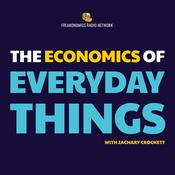18 episodes
Listener Letter: Meet Jay
14/8/2025 | 14 mins.
What happens when harm comes from someone you expected to feel safest with? When your shared identity becomes the very weapon used against you? In this final Listener Letter, Jay shares the story of his short-lived “dream job” under a charismatic Black female founder known for championing diversity. Within seven weeks, the role left him emotionally broken, suicidal, and doubting his sense of masculinity and identity.This episode explores what it means to experience narcissistic abuse from within your own community, and the devastating effects of progressive language being used as a smokescreen for harm. It also examines the psychological toll of trying to be the “good man” in environments that punish gentleness, humility or empathy.Expert InsightClinical psychologist Dr. Daksha Hirani offers compassionate, trauma-informed insight into:Why people weaponise identity (race, gender, power) to protect their image while abusing others behind the scenesThe masculinity myth: how society and workplaces distort what it means to be a "good man"How guilt can be used to silence victims within communitiesWhy shared identity does not guarantee shared values or safetyPractical recovery tools: journaling for validation, therapeutic support, and radical self-trustKey themesWeaponised Identity: When race, gender, and progressiveness are used to shield toxic behaviourProgressive Abuse: The dissonance between public values and private actionsCommunity Guilt: The fear of being disloyal by calling out harm from someone within your communityMasculinity & Vulnerability: How “being a good man” can become a survival strategy and how it’s exploitedEmotional Fallout: From humiliation and burnout to suicidal ideation and therapyRebuilding Self-Worth: How to regain confidence after gaslighting, betrayal, and shameWhy this episode mattersThis episode goes where many don’t: into the deeply taboo topic of harm within marginalised communities, and the confusion, grief, and guilt that comes with it. Jay’s story asks difficult questions about complicity, silence, and who deserves protection. It’s also a powerful exploration of how Black men, in particular, are pressured to soften themselves in professional settings, only to be punished, dismissed, or manipulated. Bonus episodesListener Letters are real stories submitted by the Other Box community, sharing lived experiences of navigating toxic workplaces and narcissistic dynamics. Each letter is anonymised, read aloud, and followed by expert insight from clinical psychologist Dr. Daksha Hirani. Together, we unpack the behavioural patterns at play and share tools for clarity, support and recovery.We hope these real-life accounts allow you to recognise the signs sooner and start focusing on how to reclaim your life. Support the PodcastIf this episode resonated with you:Subscribe and leave us a reviewShare with friends, family, or colleaguesFollow us on socials for more insights and behind-the-scenes content (@otherbox) You can connect with Other Box: otherbox.co/podcast for further resources. Narcissism At Work is a co-production from Other Box and Breaking Atoms. Subscribe to get new episodes as soon as they drop. Hosted on Acast. See acast.com/privacy for more information.
How to build healthy inclusive workplaces
11/8/2025 | 53 mins.
In our final episode, we explore what it actually means to build a healthy workplace, shifting our focus from toxic behaviours to constructive solutions. We welcome back clinical psychologist Dr. Daksha Hirani and our special guest, Raakhi, Other Box’s HR consultant.So, what does psychological safety look like? How do we promote leadership that centres empathy, accountability, and emotional intelligence, and stop toxic traits from contaminating workplace culture? It’s not enough to just survive narcissistic environments; we want to help you build better ones.If you’ve ever asked yourself, “What would it actually look like to work somewhere safe, respectful, and human?”, this episode is for you.What we cover:Distinguishing between what healthy leadership vs toxic leadership look likeThe difference between psychological safety and performative cultureThe risk of relying on one person to carry out cultural changeWhy DEI must be built into systems, not left to personalitiesThe need for accountability processes — even when a narcissist has leftSupporting teams through grief, exhaustion, and confusion after abuseHow to rebuild trust from the bottom upReferences and Frameworks MentionedThe Power of Psychological Safety: Creating environments where people feel safe to speak up, fail, and growSigns of False Belonging: When connection is rooted in fear, guilt, obligation, or overidentification with the missionBoundary Setting in Practice: Scripts, habits, and mental reframes to protect energy without shutting down Quote Highlights“Healing a workplace after narcissistic harm isn’t just about getting rid of one person, it’s about unlearning the culture that enabled them.” Raakhi Tanvi“Belonging isn’t something you perform, it’s something you practice, over time, in safe spaces.” Leyya Sattar“Accountability isn’t punishment. It’s the most loving thing a workplace can do for its people.” Dr. Daksha HiraniWhy it matters:Whether you're still stuck in a toxic workplace, in recovery, or leading a team yourself, this episode offers a roadmap. You can rewrite the narrative. Culture is built moment by moment, and it begins with how we treat each other when no one is watching.Support the PodcastIf this episode resonated with you:Subscribe and leave us a reviewShare with friends, family, or colleaguesFollow us on socials for more insights and behind-the-scenes content (@otherbox) You can connect with Other Box: otherbox.co/podcast for further resources Narcissism At Work is a co-production from Other Box and Breaking Atoms. Subscribe to get new episodes as soon as they drop. Hosted on Acast. See acast.com/privacy for more information.
Listener Letter: Meet Dani
07/8/2025 | 12 mins.
In this week’s Listener Letter, we meet Dani, who shares their experience of a working relationship that spanned eight years, one that began in mutual respect and creative fire, and slowly devolved into manipulation, emotional intimidation, and a cycle of abuse that nearly destroyed their marriage and mental health. It’s a painfully honest account of what it’s like to work side-by-side with a narcissist as your co-founder or collaborator. As the stakes got higher, the gaslighting became more brutal, and the writer found themselves slowly absorbing the narcissist’s traits, from bullying, controlling, and drinking alcohol to cope.What happens when we lose ourselves in the name of loyalty, reputation, or protecting something we helped build? And how do we forgive ourselves when survival morphs us into someone we barely recognise?Expert InsightClinical psychologist Dr. Daksha Hirani offers compassionate, trauma-informed insight into:The idealise–devalue–discard cycle common in narcissistic abuseHow trauma bonding and avoidance behaviours (like drinking, people-pleasing, or becoming aggressive) become survival responsesThe difference between manipulation masked as admiration and genuine partnershipWhy grief, self-forgiveness and radical acceptance are essential to healingKey themesComplicity and Enabling: Dani saw themselves as anti-toxic leadership, yet found themselves protecting abuse out of fear and loyaltyManipulation as Maintenance: Compliments, gifts, and praise were used after abuse to reset power dynamicsTrauma Responses: Mirroring narcissistic traits (e.g., passive-aggression, control, drinking) as a form of survivalReputation over Reality: The fear of damaging the company’s image kept the abuse hidden and unchallengedPsychological Spillover at Home: Dani’s personal life suffered deeply from mental health crises, alcohol misuse, and family breakdownWhy this episode mattersThis story will resonate with founders, creatives, managers, and anyone who has stayed in toxic dynamics longer than they should, especially when success, identity, or loyalty is on the line. Dani’s story shows how long-term exposure to narcissistic abuse erodes your values, your behaviour, and your sense of self. And it highlights the most painful part of all: realising you were complicit in harm while trying to survive it.Bonus episodesListener Letters are real stories submitted by the Other Box community, sharing lived experiences of navigating toxic workplaces and narcissistic dynamics. Each letter is anonymised, read aloud, and followed by expert insight from clinical psychologist Dr. Daksha Hirani. Together, we unpack the behavioural patterns at play and share tools for clarity, support and recovery. We hope these real-life accounts allow you to recognise the signs sooner and start focusing on how to reclaim your life.Support the PodcastIf this episode resonated with you:Subscribe and leave us a reviewShare with friends, family, or colleaguesFollow us on socials for more insights and behind-the-scenes content (@otherbox) You can connect with Other Box: otherbox.co/podcast for further resources. Narcissism At Work is a co-production from Other Box and Breaking Atoms. Subscribe to get new episodes as soon as they drop. Hosted on Acast. See acast.com/privacy for more information.
Boundaries, Burnout and Breaking Free from Toxic Workplaces: How to Protect Yourself Against Narcissists
04/8/2025 | 35 mins.
What happens when trying to protect yourself at work gets twisted into “not being a team player”? Or when being firm gets labelled as “aggressive”?In Episode 7 of Narcissism At Work, Leyya and Dr. Daksha Hirani unpack how to set boundaries in environments where narcissistic dynamics thrive. From subtle manipulation to outright sabotage, we explore the tactics that leave people feeling unsafe, hypervigilant, or scared to speak up, and what you can do about it.Dr. Daksha outlines how to spot narcissistic behaviour at the peer level, how to deal with emotional baiting and boundary violations, and why guilt, self-doubt, and trauma bonding keep us stuck. We also discuss practical ways to protect your mental health when the people around you won’t respect your limits and how to get clear on what is, and isn’t, your responsibility.Whether you’re being isolated, undermined, or constantly made to question yourself, this episode is for anyone who’s had their empathy exploited in a workplace built on power games.Key Themes:Boundary Violations: Why narcissistic colleagues push limits and how to hold your ground.Guilt and Trauma Bonding: The emotional traps that keep you compliant, over-functioning, and quiet.Gaslighting and Undermining: How narcissists create confusion and destroy confidence.Protective Tools: How to document patterns, detach your identity from abuse, and set limits with clarity.The Body Knows: Listening to anxiety, dread, and physical cues as warning signals.Quote Highlights“The key here is knowing yourself. What do you need to look after yourself? Anything that comes in the way of this would require a boundary.” – Dr Daksha Hirani“So many of us end up staying for years, clinging onto the hope that things will get better. We gaslight ourselves. We justify the chaos.” – Leyya SattarWhy it matters:Workplace abuse is often subtle, systemic, and dismissed as “just a clash of personalities.” But when manipulation, gaslighting, and boundary violations become the norm, the impact on our mental health, identity, and ability to trust again runs deep. This episode unpacks the insidious nature of narcissistic behaviour at work, how it operates, why it’s so hard to leave, and what recovery actually requires.Whether you're feeling emotionally drained, questioning your reality, or stuck in a cycle of self-blame, this episode offers both clarity and compassion. With expert insight from clinical psychologist Dr. Daksha Hirani, we explore trauma bonding, DARVO, boundary setting, and the role of systems (like HR and legal) in upholding or dismantling abuse.This isn’t just about identifying bad bosses, it’s about reclaiming your power, trusting your body’s signals, and learning how to heal without hardening. It’s for anyone who’s been silenced, second-guessed, or simply wants to build healthier, safer workplaces.Support the PodcastIf this episode resonated with you:Subscribe and leave us a reviewShare with friends, family, or colleaguesFollow us on socials for more insights (@otherbox) You can connect with Other Box: otherbox.co/podcast for further resources Narcissism At Work is a co-production from Other Box and Breaking Atoms. Please make sure to subscribe, rate and share too! Hosted on Acast. See acast.com/privacy for more information.
Listener Letter: Meet Faisa
31/7/2025 | 11 mins.
In this bonus episode, Faisa writes in as a manager whose confidence was shattered by a direct report who consistently blurred the line between vulnerability and manipulation. From rejecting basic feedback and weaponising mental health language, to quietly shifting blame and undermining leadership through conflicting narratives, this experience explores what happens when managers, especially empathetic, conscientious ones, find themselves unable to do their job for fear of being seen as "cold," "mean," or "sabotaging."This story is a must-listen for anyone navigating emotionally complex team dynamics, and a vital reminder that toxic dynamics aren’t exclusive to senior-level roles.Expert InsightClinical psychologist Dr. Daksha Hirani offers compassionate, trauma-informed insight into:The concept of weaponised incompetence and how empathy can be used against youHow to reclaim your voice, your confidence, and your authority as a managerWhen guilt is unjustified, and how to separate emotional manipulation from support needsPractical tips for documentation, boundary setting, and healing from leadership traumaKey themesWeaponised Vulnerability: Using mental health language to deflect responsibility or silence accountabilityGaslighting and Narrative Control: Contradicting stories to different people, making the manager seem unstable or unkindGuilt + Gendered Power Dynamics: The fear of being seen as "sabotaging" a junior woman's career, especially as a woman in a senior roleLoss of Confidence in Leadership: Lingering anxiety, fear of managing again, and emotional burnoutHow to Reclaim Trust in Yourself: Practical tools to navigate manipulation while staying true to your valuesWhy this episode mattersNot all narcissistic dynamics look like shouting CEOs. Some are quiet, confusing, and disguised as wellness, vulnerability, or even friendship. Faisa’s story sheds light on the often invisible burnout that comes from managing someone who continually avoids accountability while presenting themselves as the victim. It’s a form of gaslighting that leaves empathetic leaders questioning their instincts, doubting their decisions, and, too often, abandoning leadership altogether.Bonus episodesListener Letters are real stories submitted by the Other Box community, sharing lived experiences of navigating toxic workplaces and narcissistic dynamics. Each letter is anonymised, read aloud, and followed by expert insight from clinical psychologist Dr. Daksha Hirani. Together, we unpack the behavioural patterns at play and share tools for clarity, support and recovery. We hope these real-life accounts allow you to recognise the signs sooner and start focusing on how to reclaim your life. Support the PodcastIf this episode resonated with you:Subscribe and leave us a reviewShare with friends, family, or colleaguesFollow us on socials for more insights and behind-the-scenes content (@otherbox) You can connect with Other Box: otherbox.co/podcast for further resources. Narcissism At Work is a co-production from Other Box and Breaking Atoms. Subscribe to get new episodes as soon as they drop. Hosted on Acast. See acast.com/privacy for more information.
More Business podcasts
Trending Business podcasts
About Narcissism At Work
Listen to Narcissism At Work, Life and Leadership Podcast and many other podcasts from around the world with the radio.net app
Get the free radio.net app
- Stations and podcasts to bookmark
- Stream via Wi-Fi or Bluetooth
- Supports Carplay & Android Auto
- Many other app features
Get the free radio.net app
- Stations and podcasts to bookmark
- Stream via Wi-Fi or Bluetooth
- Supports Carplay & Android Auto
- Many other app features

Narcissism At Work
download the app,
start listening.




































